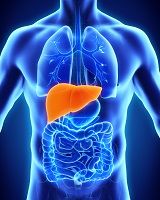Article
Liver Cancer Target Found
Author(s):
Researchers believe they have found a novel therapeutic to target a growth factor pathway that plays a role in liver cancer.

Researchers believe they have found a novel therapeutic to target a growth factor pathway that plays a role in liver cancer.
Though there is as yet no clinical data, the initial findings from animal studies were exciting enough that the European Society for the Study of the Liver decided to highlight them April 24 at a news conference, selecting the research paper out of more than 1,400 presented in poster sessions at the International Liver Congress in Vienna, Austria.
Klaus Hoeflich, PhD, of Blueprint Medicines in Cambridge, MA, presented the data.
Company researchers have found that fibroblast growth factor 19 (FGF19) the ligand for fibroblast growth factor receptor 4 (FGFR4) is made in the ileum and delivered to the liver via portal circulation. But in some people with hepatocellular carcinoma (HCC) FGF19 is amplified and up to a quarter of tumors overexpress FG19.
This can promote liver tumor formation in mice, but the process can be blocked by inhibiting FGFR4 signaling.
The company believes that FGFR4 inhibition could hold the key to treating HCC patients whose tumors have an active FGF19/FGFR4 signaling axis.
They also think they have such an agent in BLU-554, a small molecule that inhibit FGFR4.
In an interview, Hoeflich said the company researchers are in conversations with many major medical centers in the US that practice translational medicine and hope to begin clinical trials of BLU-554 this year.
“BLU-554 is exquisitely selective for FGFR4” compared to other kinases, Hoeflich said.
In the abstract, the researchers said HCC cell lines with an activated FGFR4 signaling pathway stopped reproducing and showed apoptosis when treated with BLU-554.
“These findings demonstrate a novel therapeutic strategy that targets a defined subset of HCC patients,” the team wrote.



